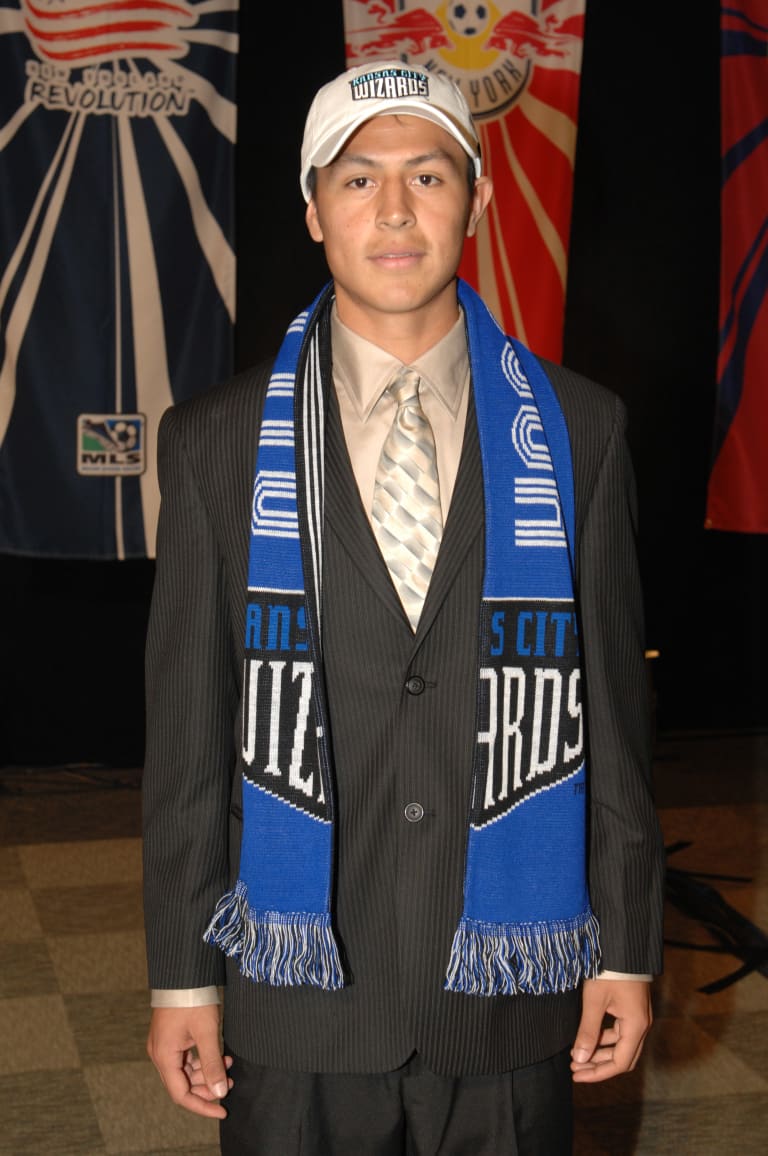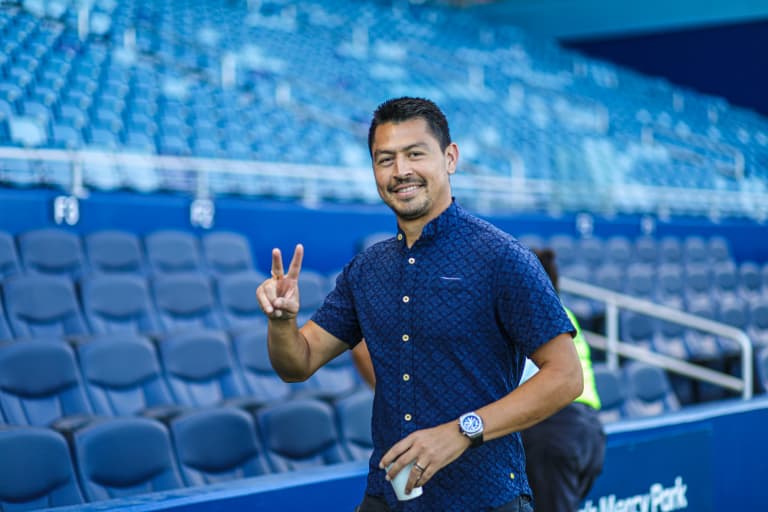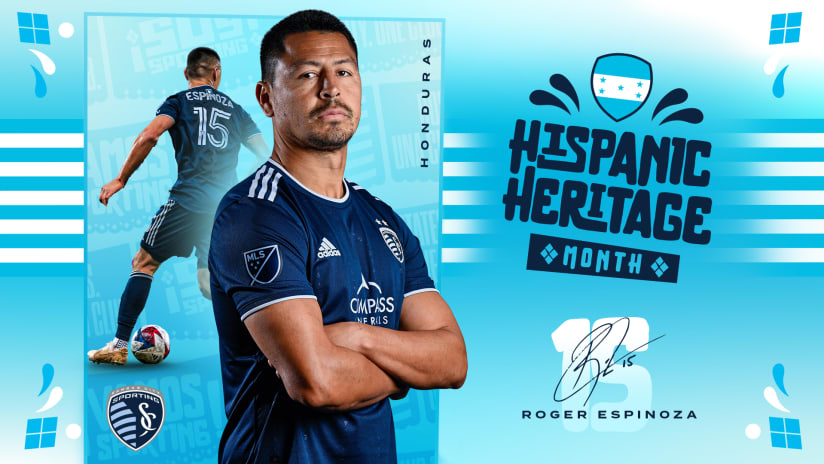Para leer este artículo en español, haz clic aquí.
Growing up you often look up to people you can see yourself in. People who share a similar background, someone whose story mirrors your own and inspires you to reach new heights. Roger Espinoza has a story that resonates with millions of people living in the United States. It's a story of discipline, hard work, and a family's desire for a better life.
Espinoza was born in Puerto Cortes, Honduras, a country which the midfielder described as a tropical place full of natural beauty where one could live very freely. Espinoza lived there most of his childhood, recalling that time with fondness and happiness.
“My childhood was great,” Espinoza said. “Not a lot of resources, but since I was a kid, I didn’t really notice. I spent my day-to-day playing with my friends. In the street playing soccer, playing hide-and-seek, in the end it was a good childhood. I went to school in Honduras until the fifth grade, I felt like it was the most marvelous life.”
After fifth grade Espinoza moved to the United States with his family leaving his hometown behind and immigrating to a new country with a different language, different culture but with infinite possibilities. Espinoza and his family moved to Denver, Co when he was 12 years old. At that age Espinoza had already established a good part of his identity back home in Honduras and emigrating to a new country meant establishing himself once again.
Immigrating to a new country has its challenges, when Espinoza first moved to the United States he moved into an apartment with his family. He recalls it being difficult creating friendships because people would not stay for long but luckily his family lived in that neighborhood for an extended period of time allowing him to set roots. Something that always helped Espinoza throughout his life was futbol. Soccer was a bridge, a bridge in which he could connect to peers his age regardless of the language. A bridge that would take him to new places, and a life many aspire to.
“Soccer has always been my connection to many people in my life,” Espinoza shared. “Soccer wasn’t as big here but during recess they played soccer without really knowing what it was. In a field of rocks, but they played. I thought everyone liked it [soccer] but it was just in recess. In that area [soccer] I was able to communicate with everyone. They knew I was the class soccer player and that brought a lot of joy to my life.”
A language barrier is always a hurdle to overcome when first immigrating to a new country, but luckily the area where Espinoza and his family moved had a bustling Hispanic community. This community allowed them to form roots and friendships. With the support of his community and his competitive spirit Espinoza began to learn English. English is not an easy language; in fact, it's considered one of the hardest languages to learn because of its many intricacies. But Espinoza has never met a challenge he couldn't face. His competitive spirit, determination, and discipline helped him learn the language in the first couple of years of living here.
“The people there [in the community] spoke a lot of Spanish,” Espinoza continued. “That kind of made it more difficult for me to speak Spanish. When I went to school or other places, it was difficult but little by little being in a formative age time passes quickly. After a year or two you are communicating with everyone and getting used to the culture a little and what it means to be in the United States. Life goes fast and I adapted.”
That same competitive spirit helped Espinoza succeed in school and on the pitch. When Espinoza’s parents first moved to the United States, they never envisioned that their child would become a professional soccer player. Soccer was an after-school activity, a hobby, but it was a way for their child to enjoy time and stay connected to his culture. But soccer also brought him great opportunities.

Debuting as a professional soccer player was a dream come true for Espinoza, but it was also a dream come true for his family. Maybe they never envisioned Espinoza becoming a professional soccer player but when his family made the decision to come to the United States, they made that decision with the hope that he would have more opportunities, that this country would help him achieve his goals. And that's exactly what happened.
“My family came here for a better life, for opportunities,” Espinoza said. “This is the land of opportunity. Because you don’t play soccer, you graduate from university and there are an infinite number of opportunities to do what you want.”
“Soccer wasn’t the most important thing for them, but it was a part. For them it was a distraction for me to have a goal. Playing soccer would take you to college because in those times, to play in high school and college you had to have good grades. So, I tried to do my best and the opportunity came to play soccer. It was an opportunity I never imagined this country would give me.
That opportunity presented itself in my junior year of university, to come here [Kansas City] and my parents were very proud and very happy that I reached my goal. That was what they wanted, for me to follow the opportunities that presented themselves in my life.”

Those same hopes and dreams Espinoza’s parents had, are the hopes and dreams of many immigrants living in the United States. Searching for more opportunities hoping to see their children reach all their goals and dreams, living in a country where anything is possible. It all began with a decision to leave the country they had known and move into the unknown. That decision, mixed with dedication, hard work, and perseverance, is what took Espinoza to places he never imagined.
After playing for Sporting KC for several years, Espinoza had the opportunity to play in England with Wigan Athletic FC. This opportunity brought a second move to a new country for Espinoza. This time the story was a little different - there wasn't a language barrier but more so a culture change. Espinoza recalls that time with happiness, laughing as he recalled how his teammates, we're so confused how he spoke with American accent but was also culturally and ethnically Hispanic.
“I went [to England] for soccer, which I loved,” Espinoza shared. “When I came as a child from Honduras to the Unites States, it wasn’t for soccer, it was for family reasons. To have a better life and the opportunity to be the person that I am now. My parent’s dreams and those opportunities took me to England.”
“There, I spoke English- a little different- but even that fact made people like you, for your accent. The same way we like English accents in the United States. It was strange because I spoke English like an American but maybe didn’t look like one.”
After his time in England, Espinoza returned to Kansas City, his second hometown. Kansas City has been an important place in Espinoza’s life; not only is it the city where he made his professional debut, but the city where he first achieved his dreams. The city welcomed him, supported him and he's found a community here. On the team, Espinoza has taken on a leadership role. After 10 plus years with the club, Espinoza is someone younger players look up to. He's someone they can go to for advice, helping new players adjust and sometimes even acting as a translator. Espinoza is a player that many young people can see themselves in. The midfielder is a first generation Hispanic American, like millions of Hispanics in the United States. Completely from Honduras and completely from the United States, Espinoza lives in a bicultural world like many young people in the United States. For Espinoza, keeping a connection to his culture, his language, and his dedication are pillars to his success.

“You have to apply yourself, and something will come out of it,” Espinoza shared his advice for kids in the community. “We know that graduating from high school means a lot to Latinos. And there will be tons of opportunities that are going to come after finishing high school. And that goes with Latino culture. Keep speaking Spanish because if you keep speaking Spanish the opportunities are even greater than a person who only speaks one language.”
“So having Spanish as a reference helps a lot. Keep working hard, it's not the end of the world just one little thing. There are many things that lead one to have many opportunities and the Latino culture is what leads you to be very different. Because having two cultures in one country is very nice and people, especially American people, will appreciate it.”
It's incredible to see Espinoza play at Children’s Mercy Park. He's always giving 100%, a force in the midfield - making his presence known, but what's most incredible is knowing the story and sacrifices that brought him to the pitch. It's known that the decision of his parents and their sacrifices to give their family a better life were the catalysts for Espinoza to live his dreams. It's a story like so many in the community - a story that resonates with millions.
So, when you see Espinoza playing on the pitch think of his hard work and dedication, and hopefully you can see a little bit of yourself reflected in the midfield.
Stay tuned throughout Hispanic Heritage month to learn more about Sporting’s Spanish speaking players! Get to know the stories and culture that lives within the Hispanic community of Kansas City. For more content like this, visit our Spanish website at es.sportingkc.com and follow us on Twitter @SoySporting, to be the first to know when the next article in our Hispanic Heritage series is released!





